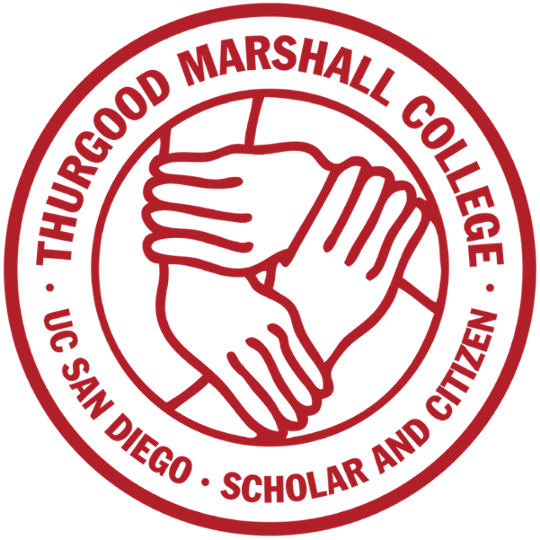Mission and Philosophy
Mission and Philosophy
At Thurgood Marshall College we are dedicated to helping students from all majors become engaged citizens who are committed to serving society. Marshall students understand that their professional careers will take place in a larger societal context determined by complex histories and social struggles, and that they will have a hand in shaping the future.
Our core academic offerings prepare students to develop a deep analysis of the diversity of lived experiences in the United States; the institutions and movements through which justice has been advanced; and the culture—music, art, literature, and science—through which people represent and comprehend U.S. society and the world.
The Marshall College experience challenges students through engagement inside and outside of the classroom. During the course of their UC San Diego careers, students at Marshall College can expect to be equipped to:
Pursue academic success by actively questioning, researching, and analyzing information and applying what is learned to make connections between their academic and civic lives.
Build leadership skills by thinking critically and intentionally to become effective decision makers and communicators.
Develop a lifestyle that fosters well-being and achieves a balance of intellectual, physical, occupational, emotional, social, spiritual, and financial goals.
Develop cultural and social competency by understanding and respecting similarities and differences among the individuals that make up their diverse communities.
Understand the philosophy and practices of public service, and applying these skills to social and civic engagement.
Educational Philosophy
The educational philosophy of Marshall College is guided by the belief that regardless of a student’s major, the college experience must include an understanding of one’s role in society. The distinctive core sequence, which serves as the centerpiece of the College’s general education requirements, emphasizes a critical examination of American society. This three-quarter sequence, “Dimensions of Culture—Diversity, Justice, and Imagination (DOC),” challenges students to develop a historically grounded understanding of the diverse experiences that have shaped U.S. society. DOC is designed to be an interdisciplinary curriculum that explores the promise of the nation’s founding ideals juxtaposed to collective struggles to realize those ideals for all communities. Other general-education requirements include courses in mathematics, physical and biological sciences, humanities, and the arts.
Wishing to uphold the ideals set forth by the college’s namesake, students are encouraged to develop their skills not only as scholars, but also as engaged citizens. Therefore, it is our belief that scholarship and social responsibility are mutually compatible and essential. In this regard, our students receive academic credit for participating in the Partnership Schools Program and Partners-at-Learning Program (PAL) by taking courses that train and place them as tutors and mentors in local elementary schools and high schools including Gompers Preparatory Academy, Lincoln High School in Southeast San Diego, and The Preuss School UC San Diego. Because this activity shares importance with other exciting academic experiences, completion of one of these specific public service courses satisfies an upper-division general-education requirement.
Further underpinning the educational philosophy of Marshall College is the belief that the best preparation for a complex, interdependent, and rapidly changing world is a diverse course of study, complemented by in-depth study in a major of the student’s choice. This educational approach has several advantages:
- It guarantees a basic understanding of the principal branches of knowledge: humanities and arts, social sciences, natural sciences, and quantitative analysis.
- It enables students with specific goals to work in their chosen field of study as first-year students.
- It allows students who have not decided on a major to sample an array of potential majors while simultaneously satisfying the general education requirements of the college.
